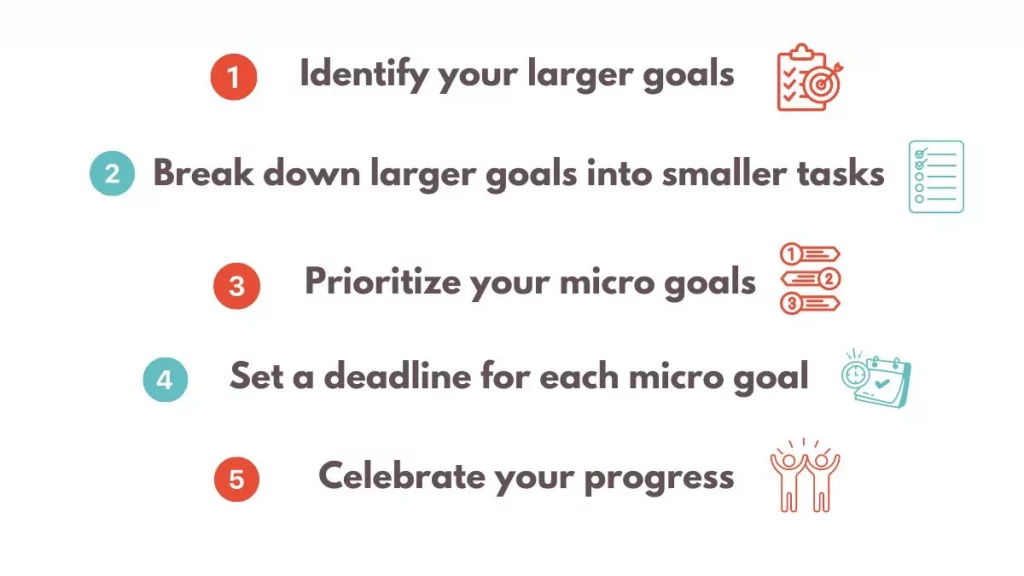Small Steps to Big Wins: The Power of Micro Goals
One of the most powerful ways to achieve your goals is to set micro goals. The University of Pennsylvania defines micro-goal-setting as “a specific and actionable goal that drives improvement, allows for a gradual approach to success, and enables tracking progress over time.” While the power of micro goals isn’t limited to personal goals like weight loss or fitness goals, they can also be applied to professional goals. This blog will discuss micro-goal-setting, the psychology behind it, and how you can use it to make your dreams come true.What are Micro Goals?
Micro goals are small, actionable steps that help to achieve bigger goals. They focus on a specific task to support progress toward a bigger goal. These goals focus on physical and actionable steps that can be completed immediately and help achieve bigger goals. They focus on a specific task to support progress toward a bigger goal. They can be thought of as a to-do list. They’re a great way to stay organized and keep track of your progress toward the larger goal. Plus, they help create positive momentum and foster continued success in your goal-setting process. When setting small goals, it’s essential to identify the level of difficulty of the goal and the time required to achieve it. This will allow you to make accurate decisions about how much time and effort you want to invest in achieving your goal. In addition, by setting goals that are small and tracking your progress, you can see if you’re on track to reach your goals over time.Other Interesting Reads
The Psychology Behind Micro Goals
Setting micro goals can be helpful for several psychological reasons. Here are a few essential explanations of why small goals lead to big changes:- Provides a sense of accomplishment: Micro goals are small, achievable tasks that we can quickly complete. Setting and achieving these goals creates a sense of accomplishment and progress. This can boost our confidence and motivation, leading to greater productivity and success.
- Increases motivation: Setting and achieving small goals can boost our motivation by providing a clear target to work towards. When we have a specific goal, we are more likely to act and stay focused on the task. In addition, each time we achieve a micro goal, we feel a sense of satisfaction and accomplishment, which can keep us motivated to continue working towards our larger goals.
- Enhances self-esteem: Achieving micro goals can enhance self-esteem and confidence. Each time we complete a task or achieve a goal, we feel a sense of pride and accomplishment. This can help us develop a more positive self-image and increase our confidence in our abilities.
- Provides a roadmap for success: Small goals can serve as a roadmap for success by breaking down larger goals into smaller, more manageable steps. Setting small goals allows us to identify the tasks we must complete achieving our larger goals. This can help us stay organized, focused, and on track toward success.

Benefits of Setting Micro Goals
Making micro goals has several benefits that can help us achieve our larger goals and improve our overall productivity and well-being. Here are some of the key benefits of making such goals:- Increased motivation: Micro goals provide a clear target to work towards and a sense of progress when completed. This can increase our motivation and make us feel more engaged with the task. In addition, setting and achieving small goals creates momentum toward achieving our larger goals, which can keep us motivated and on track.
- Increased productivity: Setting small goals can help increase our productivity by breaking larger tasks into smaller, more manageable steps. We can avoid feeling overwhelmed and reduce procrastination by focusing on one small goal at a time. We can also take advantage of the sense of accomplishment of achieving a goal, leading to increased energy and momentum for the next task.
- Greater clarity: Micro goals help to provide clarity and focus on what we need to do next to achieve our larger goals. By breaking down larger goals into smaller steps, we can identify the specific actions we need to take to move forward. This can reduce confusion and increase our confidence in our ability to achieve our goals.
- Improved time management: Setting micro goals can help to improve our time management by allowing us to prioritize tasks and allocate our time more efficiently. By breaking down larger tasks into smaller goals, we can better estimate the time required for each task and give our time more effectively. This can help to reduce wasted time and increase our overall productivity.
- Enhanced self-esteem: Achieving small goals can help to enhance our self-esteem and confidence by providing a sense of accomplishment and progress. Each time we achieve a goal, no matter how small, we build confidence in our ability to succeed. This can lead to greater self-esteem and a more positive self-image.
How to Create an Excellent Micro Goal?
Here are five steps to help create small goals at work:
- Identify your larger goals: Begin by identifying your larger goals. These are the overall objectives that you want to achieve. Please make sure they are specific, measurable, and attainable.
- Break down your larger goals into smaller tasks: Once you have identified them, break them down into smaller tasks. These tasks should be specific and achievable within a relatively short period. You can use a to-do list or task management tool to keep track of your micro goals.
- Prioritize your micro goals: Prioritize your goals based on their importance and urgency. This will help you focus on the most critical tasks first and use your time best.
- Set a deadline for each micro goal: Set a deadline for each small goal to help you stay on track and ensure that you are making progress towards your larger goals. Make sure the deadlines are realistic and achievable within your set timeframe.
- Celebrate your progress: Finally, celebrate your progress. Take time to acknowledge the completion of each micro goal, no matter how small. This will help to boost your motivation and keep you focused on achieving your larger goals.
Tips for Making Your Micro Goals More Effective
When setting and achieving small goals, using the SMART framework is essential. Here are some tips to help make these goals more effective:- Make them specific: Be specific when setting small goals. Clearly define what you want to achieve and ensure your goals are measurable. This will help you to stay focused and track your progress.
- Keep them achievable: Make sure your micro goals are achieved relatively quickly. This will help to keep you motivated and prevent you from becoming overwhelmed.
- Prioritize them: Prioritize your small goals based on their importance and urgency. This will help you focus on the most critical tasks first and use your time best.
- Set deadlines: Set a deadline for each micro goal to help you stay on track and ensure that you are making progress towards your larger goals. Make sure the deadlines are realistic and achievable within your set timeframe.
- Be flexible: Be willing to adjust your small goals if needed. If you find that a goal is not achievable or irrelevant, adjust it accordingly. Flexibility will help you stay on track and make the most of your time.
Conclusion
In conclusion, micro goals can be a powerful tool for success in various life aspects. Individuals can increase their motivation, focus, and productivity by breaking down larger goals into smaller, more manageable steps. In addition, small goals can help individuals to overcome procrastination, build self-confidence, and create positive habits that lead to long-term success. By following the steps outlined in this blog and incorporating the tips for setting effective small goals, individuals can set themselves up for success and achieve their desired outcomes. Whether in personal or professional life, goal-setting can help individuals reach their full potential and create a life they are proud of.Big or small – are your goals effective?
Learn more about your goal-setting skills to perfect the art of setting goals as a manager.
Other Related Blogs
How to Set Effective Learning and Development Goals?
This blog highlights how effective learning and development goals are set, why is setting them important for your organization and what challenges you might face during this process. … Read…
Are you on track to meet your Q1 goals?
Are you on track to meet your Q1 goals? We are in the middle of the first quarter of 2024. Seems hard to believe. It surely is! ⏰ Time has…
5 Secrets Of Solid Goal Setting At Work You Can’t Miss
5 Secrets Of Solid Goal Setting At Work You Can’t Miss “I don’t focus on what I’m up against. I focus on my goals and I try to ignore the…
Understanding the world of Goal Setting Coach to reach new heights
Understanding the world of Goal Setting Coach to reach new heights Setting and achieving goals is essential for personal and organizational success in today’s fast-paced and competitive work environment. However,…


